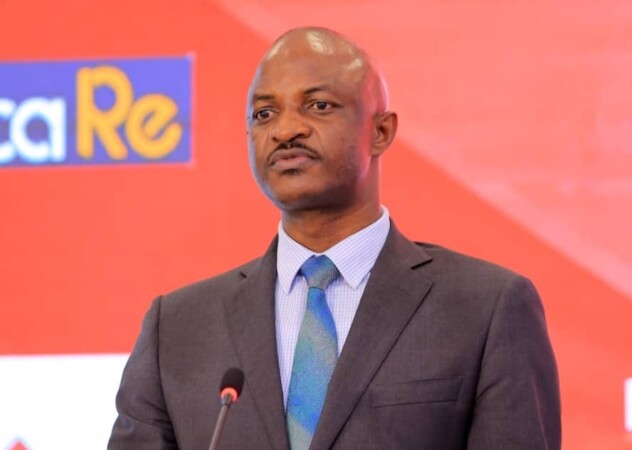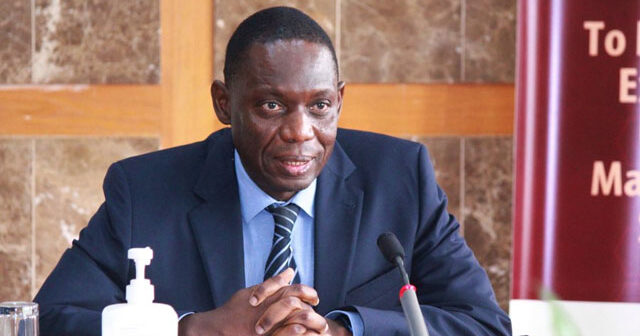An ongoing major restructuring at the Bank of Uganda (BoU) has sparked unease, with some insiders claiming position merger and demotion recommendations appear targeted to purge loyalists of former Governor Tumusiime Mutebile.
The Central Bank’s spokesperson, Ms Charity Mugumya, withheld comments on the exercise that she said was still “ongoing”.
“Communication will be made to the relevant stakeholders when the exercise is complete,” she said in response to our inquiries.
The overhaul officially aims to meet requirements in legislation, align staff workload and administrative structures to a modernising Central Bank.
Initial conversations about the shake-up were started under Mutebile’s tenure, but actual exercise commenced when KPMG audit firm was contracted and started work on June 20, 2022 to February 10, 2023
Costing Shs1.4b, the Organisational Structure Review (OSR) exercise was to produce an organogram aligned to the bank’s strategy, rationalise staffing, and costs to drive up productivity and operational efficiency.
Highly-placed sources said trouble started when the bank’s top management – including executive directors who constitute the executive committee or excom – were excluded from having an input in the restructuring allegedly on the guidance by the Deputy Governor, Mr Michael Atingi-Ego, on grounds that they would be conflicted.
Mr Michael Atingi-Ego, the BoU Deputy Governor
One official, speaking on condition that they are not named, said side-stepping senior officials responsible for the day-to-day running of the bank, who also carry institutional memory, red-flagged a bias.
There is a secondary problem, however; of concentration of power in Mr Atingi-Ego’s hands that his internal critics accuse him of misusing to purge out Mutebile loyalists and build his own power base.
The genesis is legal, but it has been illuminated by President Museveni not appointing a substantive Governor for BoU since Mutebile died fourteen months ago.
Mr Atingi-Ego, a widely experienced economist who has worked with international financial institutions, was named Deputy Governor on March 29, 2020, and was designated acting governor when the substantive holder of the office passed on, on January 23, 2022.
The law establishing the Central Bank provides that the Governor, who is the administrative head of the Central Bank, doubles as chair of its Board, which is the institution’s highest policy organ and overseer of general management.
With Mutebile dead, and no replacement named, Mr Atingi-Ego has, thanks to the law, found himself the acting BoU Governor and stand-in Board chairperson, the substantive Deputy Governor, and substantive Central Bank Board Vice Chairperson.
The Bank of Uganda Act designates the Secretary to Treasury as another permanent Board member alongside four to six other members appointed on a renewal four-year term by the Finance minister.
Insiders now argue that the trouble the current law has created is that Mr Atingi-Ego is superintending ongoing structural and management changes on the one side and overseeing their approval by a Board he chairs.
Under Section 4 of the Bank of Uganda Act, the institution’s core mandates include formulating and implementing policies to achieve monetary and financial stability.
To effect this, the law installs the Board as the apex authority, the Governor and Deputy as top administrators and supervising executive directors who in turn are in charge of multiple departments run by directors.
There are also divisions, which fall under departments, and overseen by deputy directors or assistant executive directors. It’s these administrative structures, prescribed under sections 27 and 28 of the BoU Act, that insiders allege are being dismantled in a suspicious manner through a restructuring set to take effect at the start of the next financial year on July 1, 2023.
For a start, a special team dubbed the “OSR Steering Committee” was constituted to work with KPMG consultants for effective delivery of intended exercise objectives.

Secretary to the Treasury Ramathan Ggoobi
As staff grappled with question regarding composition of the steering committee, the list was presented to and unanimously approved by BoU board chaired by the deputy governor.
“The steering committee is chaired by the Deputy Governor to work with consultants and present a report to the Board chaired by the same person!” said one official, calling into question the logic of the relevant BoU Act provision.
Soon, changes were made to the composition of the steering committee, deemed as “conflicted”, with an ad hoc committee constitute still under Mr Atingi-Ego’s chairmanship. This time, Mr Chemonges was the only member of the original steering committee tapped alongside Mr Atingi-Ego to work with KPMG consultants on the restructuring plan.
BoU director of communications Mugumya declined to discuss the matter until the exercise is completed.
It is not that the exercise are opposed to the overhaul, with multiple of the disgruntled officials saying reforming the antiquated structure of the bank inherited in 1966 is overdue. They, however, question the manner and motive of execution.
The exercise has seen several staff shuffled around, departments merged, reporting lines realigned, some functions eliminated, and the Office of the Deputy Governor headed by Mr Atingi-Ego allotted more supervisory duties.
BoU has 979 staff out of the 1,061 ceiling provided in its approved structure. As part of the ongoing restructuring, 44 support employees will be displaced and 291 staff realigned by September 2023.
Mr Atingi-Ego has been superintending the Central Bank since Mutebile’s demise in January 2022, and working closely with the Treasury to hold together the debt-distressed economy whose growth has been plagued by spiraling inflationary pressures occasioned, among others, by Russia’s invasion of Ukraine, a bloated public administration, and domestic revenue squeeze.
Sources told this newspaper that staff welcomed the restructuring exercise on the understanding that brought it would align the institution up-to-date with current realities and its new strategic plan running until 2027.
Instead, it has provoked fears of demotions and likely job losses for high-ranking executives despite assurances by the Deputy Governor that staff will not lose employment.
Months before the exercise courted controversy, some staff were upbeat that Uganda would borrow a leaf from other countries and create new deputy governor positions to redistribute administrative functions for better institutional outcomes.
For instance, the Bank of Tanzania has three Deputy Governors, the Central Bank of Kenya Act provides for two Deputy Governors, although one has not been appointed, the Bank of Burundi has two Deputy Governors, the Central Bank of Nigeria has four Deputy Governors, and the Bank of Zambia has two Deputy Governors, among others.
“The Bank’s new strategic plan was home-grown, and staff at all levels had actively participated in the formulation of strategy, which the OSR exercise aimed at aligning the organisational structure to,” one staffer said.
It is on this basis that some employees now read mischief and claim that the exclusion of Excom members signals a vote of no confidence in them. We could not independently verify this claim as the bank said it would not discuss an exercise, which is underway.
BoU under the law is an independent institution which, in execution of its mandate, however, works closely with the Secretary to Treasury who doubles as the Ministry of Finance permanent secretary.
The current holder of the offices is Mr Ramathan Ggoobi.
In a March 9 article published in New Vision, a newspaper in which the government holds majority stake, Mr Ggoobi, in comments on the BoU restructuring, argued that “we will do mapping of the staff in the new structure such that we are able to get the right people for the right jobs”.
A senior official of the Central Bank, speaking on condition of anonymity for fear of reprimand, said “we, however, want to assure the good Mr Ggoobi that the macro-structure that was presented to the Bank of Uganda staff as the ‘approved macrostructure’ for the Bank falls short of this standard, whatever criteria you use”.
In the new structure, the BoU hierarchy comprises the board as the supreme organ, but the offices of Governor and Deputy Governor are placed on the similar scale, raising possibility of power and superiority contest.
Each is assigned a personal assistant. A new office of executive director for legal services has been created alongside Bank Secretary, director for communications and public relations, deputy director board affairs, and deputy director for corporate affairs and public relations.
The Bank Secretary role was carved as a stand-alone from the Legal Department, according to a KPMG report seen by this newspaper, owing to the need for the office to take on more strategic roles to improve corporate governance within the bank and the complexity of interactions at the Board level.
The KPMG-led restructuring has eliminated the department of Internal Audit headed by Mr Zephania Mugisha, citing duplicity of roles with the chief internal auditor. The former’s roles have been subsumed under the Chief Internal Auditor, Mr David Kalyango, who oversees a pool of internal auditors created to ensure adequate rotation.
Stamping authority?
In the new approved, there are 15 units (10 directorates and 5 departments), excluding the Chief Internal Auditor, that report directly to the Deputy Governor. However, sources intimated that the restructuring took away numerous responsibilities from executives directors to the Office of the Deputy Governor, making it “bloated and anyone should sincerely question the rationale.”
“The unique feature of this macro-structure is that there are five departments that report directly to the Deputy Governor,” a source said, contrary to the BoU which establishes executive directors as bridge between directors and the deputy of full governor.
A closer look at the affected directorates and departments show that the directorate of strategy and risk management that is headed by Ms Joyce Okello, the former personal assistant to the late Mutebile has been scrapped.
Instead, two constituent departments of strategy and innovation and risk management and compliance have been created, both reporting directly to the Office of the Bank’s Deputy Governor.
The Department of Financial Stability headed by Mr Robert Mbabazize was carved out of the Directorate of Banking Supervision whose executive head is Mr Tumubweine-Twinemanzi. Mr Mbabazize is to report directly to the Deputy Governor.
A new department of Legal Affairs headed by Ms Margaret Kasule has also been created out of the Bank Secretariat overseen by Ms Susan Kanyemibwa. Legal Affairs has been elevated to a directorate with no departments, but with divisions headed by deputy directors — all reporting to the now powerful Counsel General.
To further break the Bank Secretariat, a Communications Department has been carved to report to the Deputy Governor or Governor, leaving the Bank Secretariat with one Department of Board Affairs headed by Ms Christine Namanya, which was downgraded to a division.
The two offices of personal assistants to the Governor and Deputy Governor were reduced to the level of deputy directors. The previous BoU Board had resolved that given the nature of work of the personal assistants to the Governor and Deputy Governor, including dealing with high-level and confidential communications and often privy to top management goings-on, the two positions be at the level of executive directors.
“The downgrade of these positions is a ploy to erase the institutional legacy of Mutebile,” one staffer claimed, without providing proof.
More changes
The offices of Economic Adviser to the Governor and the Adviser for Financial Markets Development Committee held by Mr Jacob Opolot and Mr Simon Rutega, respectively, were dissolved in the new plan.
The Petroleum Investment Fund headed by Mr Philip Wabulya since February 2018 was reduced from a directorate to a section. The sovereign wealth fund is provided for under the 2015 Public Finance Management Act.
It was established as a directorate specifically for petroleum revenue investment and management in line with the law and international best practices and over the last few years, the bank had accordingly built the capacity to better manage it.
Cutting it to size when the country is inching closer to commercial oil production expected to start in the last quarter of 2025, according to the insider, raises eyebrows.
In more changes, the Operations Directorate headed by Mr Charles Abuka was sub-divided into three directorates. The Currency Department headed by Ms Christine Alupo was elevated to a directorate, Financial Markets department headed by Mr David Sajjabi was elevated to a Directorate, and Banking Department headed by Mr Valentine Ojangole was merged with the Payments Systems Department to form the Banking and Payments Systems directorate.
During a staff meeting on February 27, insiders revealed that Mr Atingi-Ego gave assurances that all staff will be absorbed in the new structure.
BoU background
The Bank of Uganda was established under the Bank of Uganda Act of 1966. It is a body corporate with perpetual succession and a common seal and may sue or be sued in its corporate name. The Act was amended in 2000 to enable the institution to among other things maintain external reserves for promoting the stability of the shilling and putting in place a financial structure that would help the country have a balanced and sustained economic growth rate. According to Article 161(4) of the Constitution, the Governor and the Deputy Governor are chairperson and deputy chairperson of the board of the Bank.Article 161(3) makes the appointment of the governor, the deputy governor and all other members of the Bank’s Board the prerogative of the President.
Story Credit: Daily Monitor


